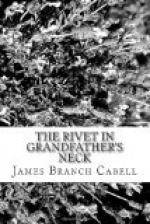“And yet we haven’t done so badly. For the most part we have sat upon the bank our whole lives long. We have produced nothing—after all—which was absolutely earth-staggering; and we have talked a deal of clap-trap. But meanwhile we have at least enhanced the comeliness of our particular sand-bar. We have lived a courteous and tranquil and independent life thereon, just as our fathers taught us. It may be—in the final outcome of things—that will be found an even finer pursuit than the old one of producing Presidents.
“Besides, we have produced ourselves. We have been gentlefolk in spite of all, we have been true even in our iniquities to the traditions of our race. No, I cannot assert that these traditions always square with ethics or even with the Decalogue, for we have added a very complex Eleventh Commandment concerning honor. And for the rest, we have defiantly embroidered life, and indomitably we have converted the commonest happening of life into a comely thing. We have been artists if not artizans.”
There was upon the table a large photograph in sepia of Patricia Stapylton. He studied this now. She was very beautiful, he thought.
“’Nor thou detain her vesture’s hem’—” said the colonel aloud. “Oh, that infernal Yankee understood, even though he was born in Boston!” And this as coming from a Musgrave of Matocton, may fairly be considered as a sweeping tribute to the author of Give All to Love.
Colonel Musgrave was intent upon the portrait.... So! she had chosen at last between himself and this young fellow, a workman born of workmen, who went about the world building bridges and canals and tunnels and such, in those far countries which were to Colonel Musgrave just so many gray or pink or fawn-colored splotches on the map. It seemed to Colonel Musgrave almost an allegory.
So Colonel Musgrave filled a glass with the famed Lafayette madeira of Matocton, and solemnly drank yet another toast. He loved to do, as you already know, that which was colorful.
“To this new South,” he said. “To this new South that has not any longer need of me or of my kind.
“To this new South! She does not gaze unwillingly, nor too complacently, upon old years, and dares concede that but with loss of manliness may any man encroach upon the heritage of a dog or of a trotting-horse, and consider the exploits of an ancestor to guarantee an innate and personal excellence.
“For to her all former glory is less a jewel than a touchstone, and with her portion of it daily she appraises her own doing, and without vain speech. And her high past she values now, in chief, as fit foundation of that edifice whereon she labors day by day, and with augmenting strokes.”
* * * * *
And yet—“It may be he will serve you better. But, oh, it isn’t possible that he should love you more than I,” said Colonel Musgrave of Matocton.




